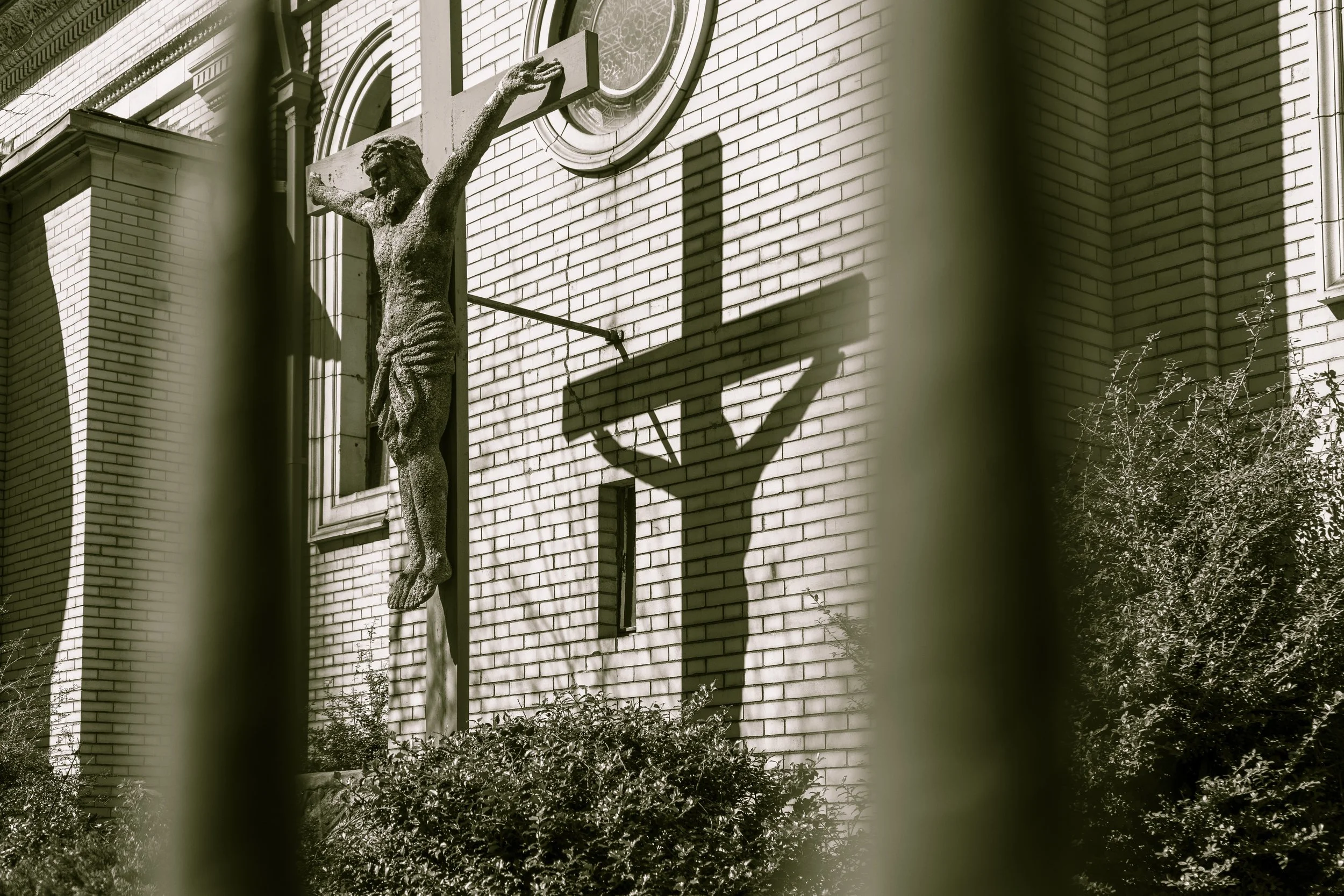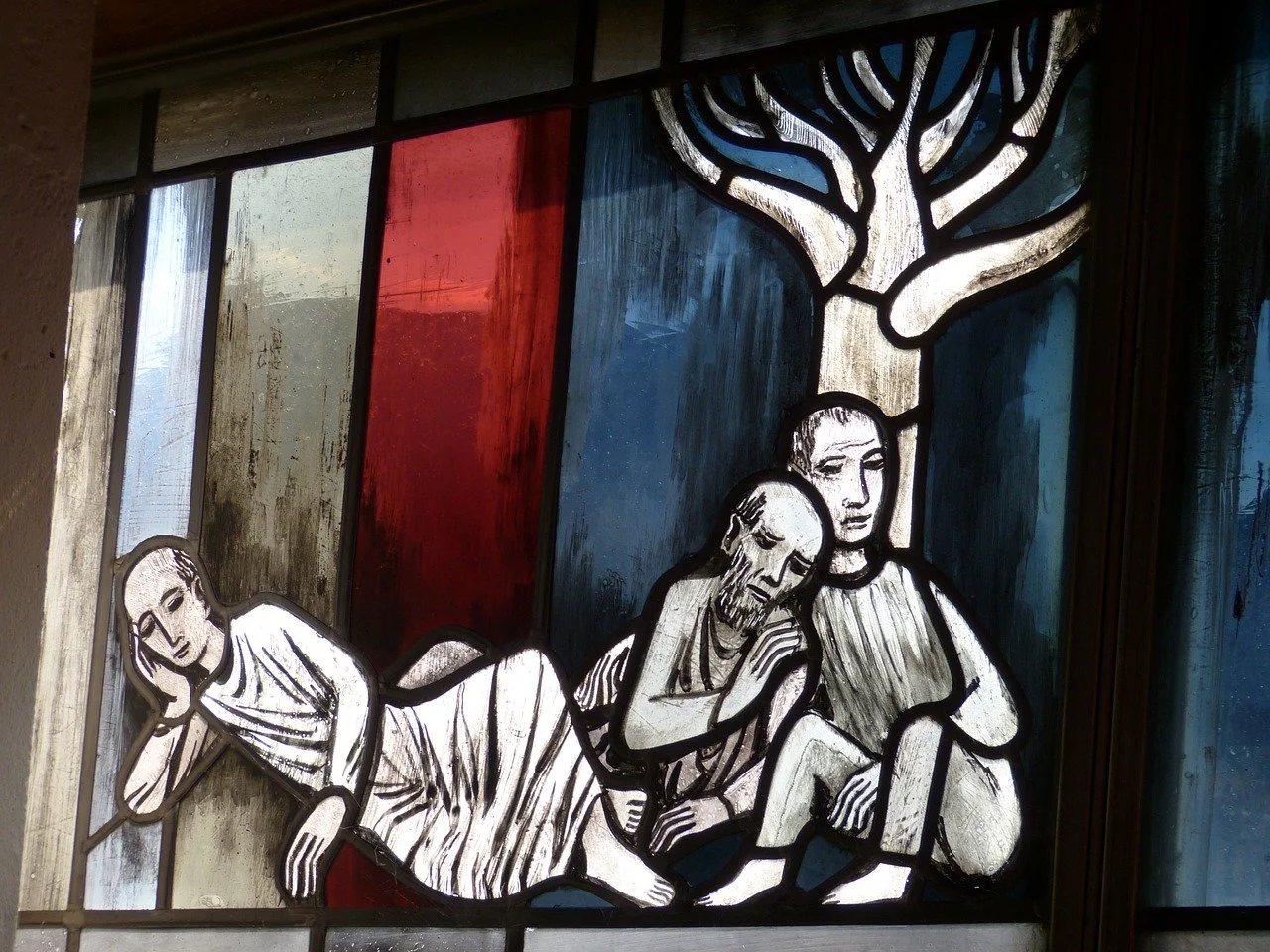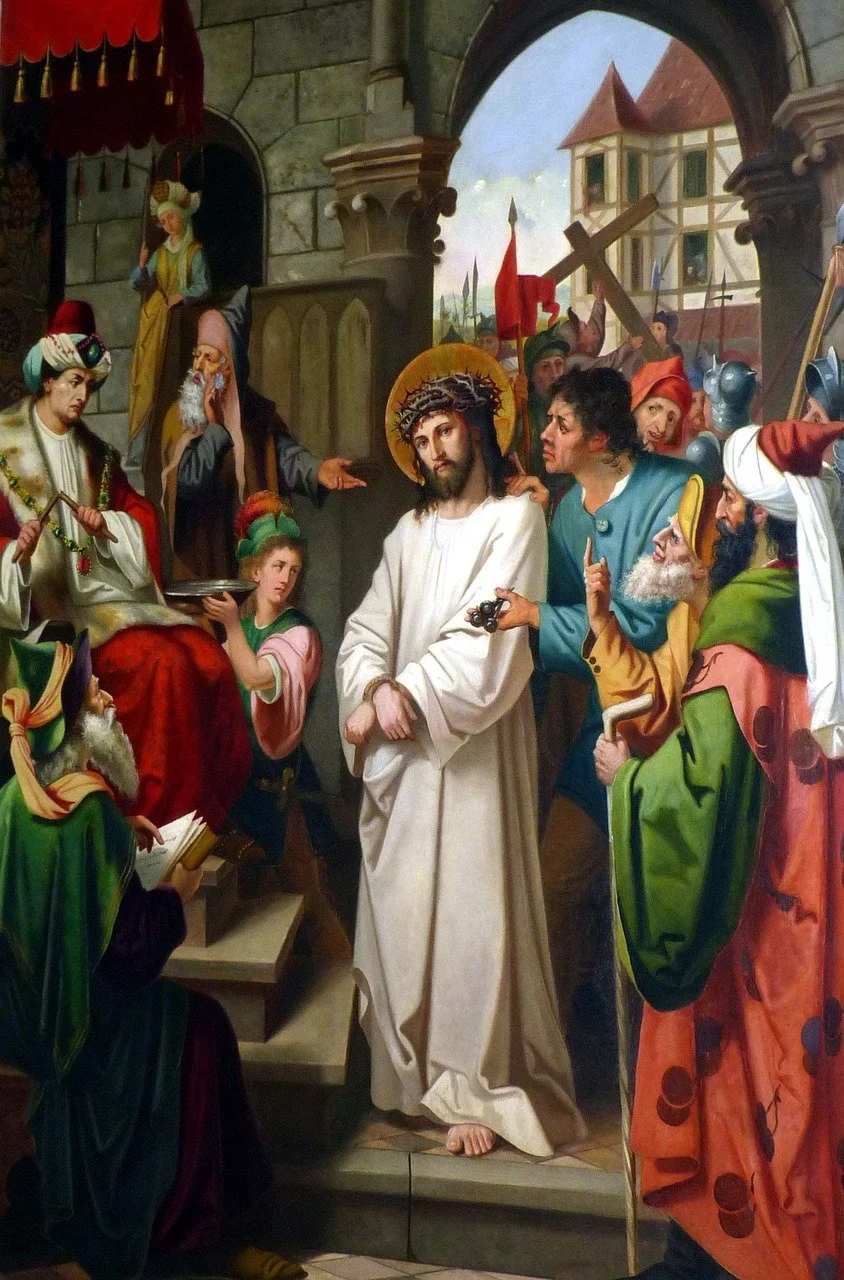FREEDOM FROM BITTERNESS (Parts 51-60)
WALKING IN FREEDOM – BITTERNESS
PART 51: THE WAY OF THE CROSS – LEAVING YOU AN EXAMPLE (3/4/22)
For this is a gracious thing, when, mindful of God, one endures sorrows while suffering unjustly. For what credit is it if, when you sin and are beaten for it, you endure? But if when you do good and suffer for it you endure, this is a gracious thing in the sight of God.
For to this you have been called, because Christ also suffered for you, leaving you an example, so that you might follow in his steps. He committed no sin, neither was deceit found in his mouth. When he was reviled, he did not revile in return; when he suffered, he did not threaten, but continued entrusting himself to him who judges justly (1 Pet 2:19-23).
[During the season of Lent, we are going to explore the way of the cross – the path to the cross of Jesus. We will look at many offenses which Jesus suffered and the manner in which He suffered them – without bitterness.]
As a prelude to the path to the cross, we need to understand the role of the cross in our own lives. Some people believe that Jesus suffered on the cross so that they can live in glory now - without pain, in luxury (“prosperity”), and in favor with all people. This view has been called the “theology of glory.” But the passage from 1 Peter above makes it clear that the suffering of Christ was not just a gift to us. The suffering of Christ was an example so that we might follow in His steps. This second view is called the “theology of the cross.”
Marva Dawn draws an important distinction between what has been called since Luther’s time “a theology of glory” as opposed to the biblical “theology of the cross.” “In Gnostic Christianity, the enlightenment of the mind enables the avoidance of suffering. In classical Christianity, the gift of the Holy Spirit leads one through the same path of suffering that was followed by the Messiah.” (From Powers, Weakness, and the Tabernacling of God, p.90, quoting, in part, Luke Timothy Johnson).
Luther’s Heidelberg Disputation addresses the theology of glory and the theology of the cross. The theologian of glory “does not know God hidden in suffering. Therefore he prefers works to suffering, glory to the cross, strength to weakness, wisdom to folly, and, in general, good to evil.” The theology of glory is natural for humans with human desires using their natural minds. A theologian of the cross, however, sees the cross (which may involve pain, suffering, weakness, or reproach) as the source of God’s involvement in the world and of the revelation of His work.
A theologian of the cross looks for God’s plan and purpose in the cross – without bitterness.
[Quoted sections are from Surrender and Trust – Book Two, Section IV, Week Two (The Cup), Day 5]
WALKING IN FREEDOM – BITTERNESS
PART 52: THE WAY OF THE CROSS – THE HOUR OF NEED (3/6/22)
And He took Peter and the two sons of Zebedee with Him, and He began to be sorrowful and very heavy. Then He said to them, “My soul is exceedingly sorrowful, even to death. Wait here and watch with Me.”
And He went a little further and fell on His face, and prayed, saying, “O My Father, if it is possible, let this cup pass from Me. Yet not as I will, but as You will.”
And He came to the disciples and found them asleep. And He said to Peter, “What! Could you not watch with Me one hour? Watch and pray that you enter not into temptation. The spirit indeed is willing, but the flesh is weak.”
He went away again the second time and prayed, saying, “My Father, if this cup may not pass away from Me unless I drink it, Your will be done.”
And He came and found them asleep again, for their eyes were heavy. And He left them and went away again, and prayed the third time, saying the same word.
Then He came to His disciples and said to them, “Sleep on now and take your rest. Behold, the hour is at hand, and the Son of Man is betrayed into the hands of sinners” (Mt 26:37-45)(MKJV).
[During the season of Lent, we are going to explore the way of the cross – the path to the cross of Jesus. We will look at many offenses which Jesus suffered and the manner in which He suffered them – without bitterness.]
“Where were you when I needed you?”
I went to visit my friend in the hospital. My friend was not ill, but her beloved husband of many years had suffered a severe heart attack that left him in a coma. It seemed the end was near and I wanted to be there for my friend.
When I visited my friend, I did not know what to say. She was experiencing significant grief and loss and there was really not anything I could do or say to soften the blow. I spent a fair amount of time with her. We did not know it but he would pass away a couple of hours after I left.
As time went on, I realized that there really is not much you can do in those situations except to be present. But presence alone can be a powerful support.
There are different categories of friends. There are good friends and there are close friends. And there are friends who are like family. In the latter category are the people that you “let your hair down” with when you are around them. These are the friends with whom you take trips together and do life together. And they are the friends that you need during your darkest times.
Jesus focused His time and ministry on 12 men. And out of these 12 men, He selected Peter, James, and John to accompany Him and to witness the “special moments” – such as the Transfiguration and the raising of Jairus’ daughter from the dead. These 3 men were arguably Jesus’ closest friends. And Jesus selected Peter, James, and John to be with Him as He prayed before His suffering and death.
Jesus asked His friends to watch and pray during His great trial. In fact, He checked with them three times. But they let Him down each time. Instead of supporting Him, they slept. “Could you not watch with Me one hour?”
If a close friend lets me down a little, it is an offense. If that friend lets me down in my hour of need, it is a breach of trust. I resent it and I tend to distance that person or, even worse, to cut off the relationship.
But Jesus did not do that. “Sleep on now and take your rest.” Jesus had grace for the shortcomings and failures of His friends. He seemed to understand that, despite their flaws, they were persons called to fulfill a purpose and destiny in the kingdom of God. To take offense and to cut them off would have been devastating to their call to ministry.
Don’t allow offense by a person cause you to damage another person’s call.
Next post: The way of the cross - Betrayal
WALKING IN FREEDOM – BITTERNESS
PART 53: THE WAY OF THE CROSS – BETRAYAL (3/8/22)
While he was still speaking, Judas came, one of the twelve, and with him a great crowd with swords and clubs, from the chief priests and the elders of the people. Now the betrayer had given them a sign, saying, "The one I will kiss is the man; seize him."
And he came up to Jesus at once and said, "Greetings, Rabbi!" And he kissed him.
Jesus said to him, "Friend, do what you came to do." Then they came up and laid hands on Jesus and seized him (Mt. 26:47-50).
“Friend, do what you came to do.”
Judas was a member of the fellowship. Jesus selected him. Jesus poured His life, ministry, and teaching into him. So when Judas crossed over to the other side, he became a traitor. It is an unequivocal, intentional, and premeditated action. And Jesus knew it.
I think I would have been screaming at Judas in Gethsemane. I would have told him that I knew exactly what he was doing. “You were with us and now you are against us. You ingrate!” I would have tried to shame him or to embarrass him in front of the other 11 disciples. I would have let them know what type of person he really was and how he had betrayed the trust of all of us. I would have described in detail how he had broken ranks and abused my friendship for sordid gain.
But not Jesus. Jesus called him “friend.” How did Jesus have such grace to resist bitterness against His betrayer and still to call Him “friend”?
“Do what you came to do.” At what point do I begin to believe that God’s purpose in my life is weightier than the bad intentions and evil actions of other persons around me? Jesus believed that this insidious act of betrayal was part of God’s plan for Him. Instead of “bowing up” and being filled with resentment and rage at Judas, Jesus submitted Himself to God and trusted God in all things. So His words to Judas were only “Do what you came to do.”
Next post: The way of the cross – the Loser
WALKING IN FREEDOM – BITTERNESS
PART 54: THE WAY OF THE CROSS – THE LOSER (3/11/22)
And behold, one of those who were with Jesus stretched out his hand and drew his sword and struck the servant of the high priest and cut off his ear. Then Jesus said to him, "Put your sword back into its place. For all who take the sword will perish by the sword. Do you think that I cannot appeal to my Father, and he will at once send me more than twelve legions of angels? But how then should the Scriptures be fulfilled, that it must be so?"
At that hour Jesus said to the crowds, "Have you come out as against a robber, with swords and clubs to capture me? Day after day I sat in the temple teaching, and you did not seize me. But all this has taken place that the Scriptures of the prophets might be fulfilled." Then all the disciples left him and fled (Mt. 26:51-56).
Thomas a Becket was the Archbishop of Canterbury in 1170. But he didn’t reach that position through religious office. Becket rose through political ranks until King Henry II appointed him as Lord Chancellor in 1155. But Henry had problems controlling the church in England. So Henry nominated Thomas a Becket as the Archbishop of Canterbury in 1162 with the expectation that he could control him. It was a shrewd political move.
Things didn’t go as Henry planned. Becket wasn’t a puppet and he resisted many of Henry’s political intrusions on the church. With the presumed approval of the King, four knights arrived at Canterbury Cathedral in 1170 to deal with Becket. The monks inside tried to bolt the doors of the cathedral but Becket stopped them and said “It is not right to make a fortress out of the house of prayer!”
The knights entered the cathedral and tried to drag Becket outside. Becket said “I am not a traitor and I am ready to die.” He grabbed a pillar and refused to go. So the knights murdered Becket in Canterbury Cathedral on December 29, 1170. (Source: Wikipedia)
The arrest of Jesus was not just a couple of peace officers serving a warrant. The high priests and elders sent a great crowd (Mt. 26:47) without a warrant armed with swords and clubs. Jesus threatened the very thing they loved - human power. They expected Jesus and His gang to put up a fight for that power. That is what revolutionaries normally do. So the high priests and elders armed up because they intended to win the battle.
Jesus’ disciples understood the situation. They were willing to fight for their King. Jesus had not let them down before. He had demonstrated superhuman power. The disciples were confident that Jesus would use his superhuman power to overcome the pesky Romans and the conniving Pharisees, and that the triumphal entry would culminate with Jesus sitting in the palace on the throne of Israel.
Instead Jesus surrendered voluntarily. He had overwhelming spiritual power, but He refused to transact in human power.
Jesus didn’t just surrender. He rebuked Peter when he tried to fight. Jesus did not allow the fight to begin. He was the voluntary Loser. And He rebuked the armed crowds for coming out for a rumble as if he was a gangster.
So the fight fizzled. Jesus’ disciples melted away and the revolution was over. Jesus was abandoned and alone – a lamb seized by the wolves.
How much bitterness arises because of the love of human power? In our world today, isn’t that what political, economic, and social forces are fundamentally fighting over – human power? If my side loses, it makes me hate the opposition. I become bitter – bitter to the point that I want revenge. So I demonize my opponents and try to ravage them…kind of like wolves do.
Next post: The way of the cross – The Commandments
WALKING IN FREEDOM – BITTERNESS
PART 55: THE WAY OF THE CROSS – THE COMMANDMENTS (3/13/22)
Now the chief priests and the whole council were seeking testimony against Jesus to put him to death, but they found none. For many bore false witness against him, but their testimony did not agree.
And some stood up and bore false witness against him, saying, "We heard him say, 'I will destroy this temple that is made with hands, and in three days I will build another, not made with hands.'" Yet even about this their testimony did not agree.
And the high priest stood up in the midst and asked Jesus, "Have you no answer to make? What is it that these men testify against you?"
But he remained silent and made no answer (Mk 14:55-61a).
Okay, so this is one of the 10 big ones. “You shall not bear false witness against your neighbor” (Ex. 20:16). The chief priests and the council certainly knew the details of the law. But every Jew knew that bearing false witness was wrong. It was one of the Ten Commandments.
Here is a tricky part: the punishment for violating this commandment. Under the law, if you bore false witness, you received as your punishment the very punishment you were trying to inflict on the other person through your false testimony. “You shall do to him as he had meant to do to his brother” (Deut 19:19a). And the priests and judges were the ones who were supposed to enforce it (Deut 19:16-19).
So a commandment was being violated by false testimony against Jesus. The accusers who bore false witness were subject to death because they were using false testimony to try to kill Jesus. And the officials who had the duty to judge the situation righteously, and to enforce the law, were in cahoots with the ones breaking the law.
“Injustice” is a word we hear often these days. We are encouraged to identify it, to call it out, and to stand up to it. Injustice is an offense and it requires a response. This situation is the very definition of injustice – both by the accusers and by the judges.
And yet Jesus remained silent and made no answer.
Consider for a moment the witness of this silence. The worldly response exposes the false witnesses. It requires some strongly written articles and editorials. The worldly response calls for an investigation of the corrupt judges – probably even the appointment of an independent prosecutor to punish their fraud.
Yet Jesus remained silent and made no answer. Jesus’ silence during this time showed restraint, humility, and self sacrifice. The silence of Jesus bore witness to His faith and trust in God.
Next post: The way of the cross - Contempt
WALKING IN FREEDOM – BITTERNESS
PART 56: THE WAY OF THE CROSS – CONTEMPT (3/15/22)
And some began to spit on him and to cover his face and to strike him, saying to him, "Prophesy!" And the guards received him with blows (Mk 14:65).
I had a friend who was a member of a culturally diverse church. Some of the church members were participating in a “peaceful protest” so my friend decided to accompany them in order to support them.
The protest was loud and boisterous. At the protest, a line of police officers formed to keep order. My friend was surprised to see many of his fellow church members spit on the police officers, curse at them, and yell derogatory names at them.
When I heard this report, I immediately thought of Jesus and the people that spat on Him. How strange that persons, who claim to serve a Lord upon whom people spat, would be the persons who themselves spat upon others!
To spit on a person is an open display of contempt. Jesus received this contempt without rancor or bitterness. Jesus did not retaliate.
How can we, as followers of Jesus, respond to the injustices and prejudices in our world today in a manner that exemplifies the spirit of our Lord and that puts His heart on display for the world to see? How can we glorify God in all things that we do?
Next post: The way of the cross - Abuse
WALKING IN FREEDOM – BITTERNESS
PART 57: THE WAY OF THE CROSS – ABUSE (3/18/22)
When he had said these things, one of the officers standing by struck Jesus with his hand, saying, "Is that how you answer the high priest?"
Jesus answered him, "If what I said is wrong, bear witness about the wrong; but if what I said is right, why do you strike me?" (John 18:22-23)
Early in my law practice, I noticed a strange pattern. Persons who were subjected to abuse tended to become abusers who inflicted the same abuse on other persons. Children of alcoholics tended to become alcoholics. The sexually abused became sexual abusers. And the physically battered became batterers. That seemed strange to me because the victims knew the pain, hurt, and damage that the abuse inflicted. Yet they inflicted the same abuse on other persons. Why did the abused become the abusers?
Abuse is pernicious. It is pernicious because it robs a person of will. Abuse is an attack on personhood. One reason that abused people become abusers is that they have been stripped of their will and can’t seem to help it.
A bully loves power – and is willing to sacrifice the lives of other persons to acquire that power. If words and accusations are not sufficient to overcome a person’s will, then the bully resorts to physical abuse. It is a means of domination and control.
But the Personhood of Jesus was intact. He received trauma, but it did not damage His will nor did it define Him. Jesus did not lash out. Jesus did not respond in kind. He simply pointed out the senselessness of the blow. How was Jesus able to do this?
The battle in Gethsemane was a battle of wills. Jesus fought this battle, but He fought it to give up His will in favor of the Father’s will. “Father, if You are willing, remove this cup from Me. Nevertheless, not my will, but yours, be done” (Lk 22:42).
So when bullies struck Jesus and tried to rob Jesus of His will, they faced something they had never faced before. The bullies could not rob Jesus of His will, because His will had already been surrendered to the Father. Jesus surrendered His will to the Father through time with the Father in prayer. We likewise surrender our will to God through our daily time of devotion and prayer.
When we give up our will to God, there is nothing to be damaged or broken. There is no bitterness, because our will is already surrendered to God, and it is not subject to manipulation by forces of evil.
Next post: The way of the cross – Confusion and Disillusion
WALKING IN FREEDOM – BITTERNESS
PART 58: THE WAY OF THE CROSS – CONFUSION AND DISILLUSION (3/20/22)
"Simon, Simon, behold, Satan demanded to have you, that he might sift you like wheat, but I have prayed for you that your faith may not fail. And when you have turned again, strengthen your brothers."
Peter said to him, "Lord, I am ready to go with you both to prison and to death."
Jesus said, "I tell you, Peter, the rooster will not crow this day, until you deny three times that you know me" (Lk 22:31-34).
We previously discussed the clear expectation by the disciples that the Messiah (“anointed one”) would become an earthly king. Peter had this expectation of kingship and he told Jesus he was willing to go to prison or even to die for His king.
Peter backed this statement up when he pulled out his sword to fight the cohort that came to arrest Jesus. But Jesus surprised Peter when He told Peter to put up his sword (Mt 26:52) and then allowed the cohort to take hold of Him. The disciples fled and were no doubt confused. Their hopes and dreams for this “Jesus movement” had taken a big hit. The way they viewed Jesus, His role, their destiny, and the world in general was being rocked.
But Peter followed Jesus at a distance to see what would happen. What was Peter feeling when he was asked about his connection to the accused, Jesus? Was it confusion? Was it disillusionment? Was it fear? Or may be a combination of all three?
Jesus called what was happening to Peter a “sifting.” “Peter, all of your worldly supports, crutches, and comforts are going to be kicked out from underneath you. We will see what is left.”
When our expectations of God are not met, disillusionment, confusion, and even fear test our faith. If we feel that the Lord has not done what we expected Him to do for us, bitterness can arise.
For some people, this bitterness leads to cynicism or even to a loss of faith. But Jesus prayed that Peter’s faith would not fail…that after all of Peter’s props were removed, a foundational core of “rock hard” faith would still sustain him during this time of crisis.
The siftings in our lives reveal the faith that is in our core.
Next post: The way of the cross – Revelation of self
WALKING IN FREEDOM – BITTERNESS
PART 59: THE WAY OF THE CROSS – REVELATION OF SELF (3/22/22)
Then they seized him and led him away, bringing him into the high priest's house, and Peter was following at a distance. And when they had kindled a fire in the middle of the courtyard and sat down together, Peter sat down among them. Then a servant girl, seeing him as he sat in the light and looking closely at him, said, "This man also was with him."
But he denied it, saying, "Woman, I do not know him."
And a little later someone else saw him and said, "You also are one of them." But Peter said, "Man, I am not."
And after an interval of about an hour still another insisted, saying, "Certainly this man also was with him, for he too is a Galilean." But Peter said, "Man, I do not know what you are talking about." And immediately, while he was still speaking, the rooster crowed.
And the Lord turned and looked at Peter. And Peter remembered the saying of the Lord, how he had said to him, "Before the rooster crows today, you will deny me three times." And he went out and wept bitterly (Lk 22:54-62).
When we begin a meaningful devotional life, two things happen and they happen in a parallel fashion. First, we grow in our understanding of God and Who He is. Second, we grow in understanding of our own hearts and of who we are.
When Jesus looked at Peter, what look did Peter see on Jesus’ face? Was it a look of reproach and shame that said “Guilty as charged”? That would be the look if Jesus was offended by Peter’s denial. My thought is that Peter saw a look of love and a look of truth – a certain reality.
Peter came face to face with Jesus and it showed Peter one thing: it showed Peter himself. So when he wept bitterly, Peter may have been weeping for his dashed expectations. But he probably was weeping even more for what his denial and the encounter with Jesus revealed about himself.
This experience was necessary for Peter to become an effective minister of the gospel. Over the hours that followed, Peter learned a lot about his self perceptions, about the true motivations of his heart, and about his broken identity. It was humbling and it was self revealing. It is what happens when we encounter the Lord.
This trial is working for good in Peter. Peter doesn’t know it, but his heart is being transformed so he can both hear and receive the revelation of his true identity in the Lord when Jesus restores him (John 21).
Peter’s denial was hard on him but it was awful good preparation for the glory that God intended for him.
Next post: The way of the cross – Conspiracy theory
WALKING IN FREEDOM - BITTERNESS
PART 60: THE WAY OF THE CROSS – CONSPIRACY THEORY (3/25/22)
When morning came, all the chief priests and the elders of the people took counsel against Jesus to put him to death. And they bound him and led him away and delivered him over to Pilate the governor.
Now Jesus stood before the governor, and the governor asked him, "Are you the King of the Jews?" Jesus said, "You have said so."
But when he was accused by the chief priests and elders, he gave no answer. Then Pilate said to him, "Do you not hear how many things they testify against you?"
But he gave him no answer, not even to a single charge, so that the governor was greatly amazed (Mt 27:1-2, 11-14).
On the way to the cross, Jesus had four “hearings” or trials.
· The appearance before the Jewish council with the chief priests and elders.
· The first hearing before Pilate.
· An appearance before Herod when Pilate realized Jesus was a Galilean and decided that Herod might have jurisdiction over the case.
· The final trial and death sentence by Pilate.
All of these hearings were driven by the religious leaders. They had decided that Jesus should die and they took counsel against Him. They conspired together to put Jesus to death.
The crucifixion of Jesus did not occur by accident. There were elements and persons who conspired to put Him to death and succeeded. There were “visible historic forces – namely, the religious leaders, Jewish and Roman politics, and the crowd (i..e., social forces) – which served as agents of more sinister invisible powers” -Marva Dawn in Powers, Weakness, and the Tabernacling of God, p.9 (quoting James S. Stewart).
The religious leaders controlled the temple, the Jewish religion, and the nation. They had political territory that they were jealous to protect and they intended to guard it carefully. A man who could raise the dead and who could sway the people was dangerous. Any anointing He may possess from the Lord was a secondary consideration.
Jesus threatened their power and control. So the high priest prophesied that one man should die for the people (Jn 11:50). That man was Jesus. So they conspired to put Him to death using all of the human power and force they could muster.
Jesus was a victim of the conspiracy to kill Him, but He tolerated the unjust proceedings without bitterness, wrath, anger, clamor, slander or malice. These unholy attitudes are traits which believers are instructed to “put away” (Eph 4:31).
Jesus rejected the temptation of an unholy response. He sacrificed His rights, His defense, His appeal, and His public reputation. The way of the cross is an example for us to follow. Jesus demonstrated to His followers how to react to injustice.
Next post: The way of the cross – Entertain us!
[Portions quoted from Surrender and Trust – Book Two, Section IV, Week Two (The Cup), Day 3]









